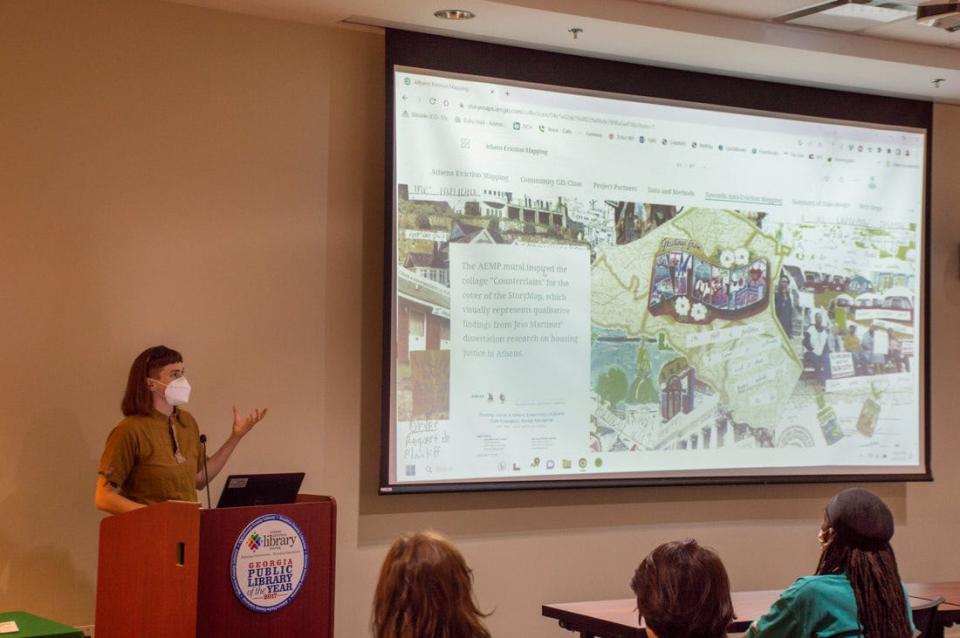UGA students and housing advocates map out evictions in Athens-Clarke County

For several months, undergraduate geography student Casey Serrano helped sort through hundreds of eviction cases filed in Athens-Clarke County. The court documents could be confusing and jargon heavy, yet through the paperwork, they'd often come across unforgettable remarks.
"The most heartbreaking thing you see in an eviction file is that if there's a child in the house when an eviction is carried out, it'll say, 'All property placed in front of the house, except a laptop which was returned to Clarke County School District," they said. "Which means that that child now, one, is definitely not doing their homework that night, and two, has to go to their teacher, their principal, their administrator and say, 'My laptop is gone,' and explain the situation."
Serrano, along with around 20 other UGA students and community members, gathered at the Athens-Clarke County Public Library on May 5 to present a massive project series analyzing local eviction data. Through a collaboration between Athens Housing Advocacy Team (AHAT), UGA's Community Mapping Lab and local government officials, UGA students sought to fill a crucial gap in knowledge about the local housing crisis.
Finding data
Jess Martinez is a PhD student at UGA's Geography Department. But their work goes beyond just academics. In February 2021, they co-founded Dignidad Inmigrante En Athens, or DIA, in response to a mass eviction of mostly Latin tenants from Tranquility Forest Mobile Home Park. DIA eventually grew into AHAT, an activist group helping working-class Athenians deal with evictions, landlords and housing insecurity.
Rapid response to eviction proceedings were a crucial part of AHAT's mission. But as Athens ushered in its new Eviction Prevention Program, AHAT members wondered how to prevent evictions in the first place. For that, they needed data.
"ACC didn't and doesn't necessarily have a comprehensive way of collecting this information," said Martinez. "AHAT began going to the magistrate court, which is where eviction files are held, to collect information from these files. We wanted to understand, well, how many evictions are happening? Who is it affected? Who are the top landlords? Who's evicting people?"
What resulted was a dataset of about 2,000 eviction filings collected from Sept. 1, 2021 through Jan. 31, 2023. The dataset included landlord names, housing locations, case outcomes, and case notes, often with remarks from the tenants being sued for eviction.
"It gives us a bigger story about what is actually happening and why we should care," said Martinez, "That it is actually very urgent, that the housing crisis is still going on."
Tenant protection: Bill offering more protections for tenants unanimously passes Georgia House
Homeless count: How many homeless people live in Athens? Local aid workers are trying to find out
A collaborative effort
UGA professor Jerry Shannon first met with AHAT through his work at the Community Mapping Lab, a research center studying geography and its relationship with social justice. Shannon, who has taught at UGA for 10 years, wanted his students to understand the real-world impacts of their work, whether that meant cataloging unmarked graves in Brooklyn Cemetery or mapping out suggested bike routes throughout Athens. One of the best ways to do that, he explained, was by bringing local organizations into the fold, too.
"We really value developing these community partnerships that help translate the research we do into social action," he said.
Shannon knew of AHAT through Martinez and another graduate student named Vanessa Raditz, who were both members of the organization. Eventually, they agreed to share the data set with Shannon's Community GIS Class. Geographic Information Systems, or GIS, is a suite of analytic tools which allow researchers to better understand spatial data and trends.
March: Housing activists march to Athens mayor's house, demand support for displaced tenants
"This particular class is called Community GIS because the goal is to think about how GIS gets used in society. So it's not just about the technical stuff of using the software, but thinking about who's using it, who's asking the questions, what is the analysis going to be used for?" he said.
After remarks from housing advocates and local government officials, Community GIS students presented six analytic projects using AHAT's dataset. Their research questions ranged from finding eviction hotspots in Athens to determining which landlords attempted the most eviction filings.
Most significantly, they made all that information publicly accessible.
"It's one thing to kind of know generally about evictions or a problem in the community," said Shannon. "It's another one to be able to see it on a map and see it described accurately."

More than just research
The May 5 event came just days after the mayor and county commission approved the 2023 Eviction Prevention Plan, a government fund supporting Athenians at risk of eviction. After running into major funding issues back in 2021, the program was put on hiatus, leaving many local tenants in a lurch.
Lisa Walker was one of them. Her apartment, along with hundreds of others throughout Athens, was purchased by Florida-based real estate company Prosperity Capital Partners last summer. The subsequent rent spike forced her out of her apartment.
"They gave us 60 days and told us we had to move," she said during a speech at the library.
Now, with the EPP back in place, there's a chance that fewer tenants will face what she went through. Commissioner Tim Denson also gave a short speech prior to the presentation, urging locals to support the EPP.
"On average, an eviction in Georgia cost the community at least $9,669 in public funds. The ... ARPA dashboard shows that $832,000 was spent avoiding 425 households from being evicted. That comes to an average cost of $1,958 per household. So that is a public funds savings of $7,711 per household served," he said. "In short, keeping people in their homes during this pandemic and beyond was not only the right thing to do, but it's economically the smart thing."
With that being said, students, government officials and advocates agreed that it would take a lot more than the EPP to prevent evictions in Athens. And while it starts with data, Walker said, it ends with standing up for your neighbors.
"I'm a survivor. ... I'm not really worried about me. What about the people that can't speak for themselves?" said Walker. "I'll fight for what's right, not wickedness."
This article originally appeared on Athens Banner-Herald: UGA students map out evictions in Athens

